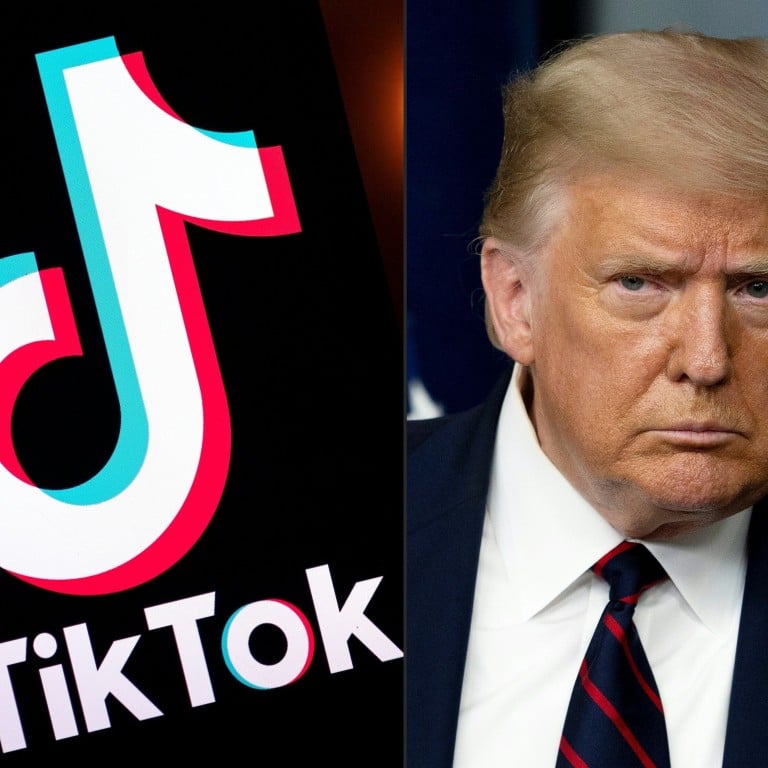
TikTok faces ‘uphill struggle’ in court challenge to Donald Trump’s ban
- The popular Chinese-owned video sharing platform has confirmed it will sue over the executive order to wind down its US operations
- Company could challenge order on grounds of due process or first amendment, but some observers are sceptical about its chances of success
TikTok’s decision to challenge Donald Trump’s order banning the popular video-sharing app is set to trigger a legal battle that many analysts see as a long shot.
The US President signed an executive order on August 6 banning TikTok within 45 days unless it is sold to US owners, citing national security concerns.
Trump made the order under a 1977 law that lets the president block transactions and seize assets in response to an “unusual and extraordinary threat”.
Trump issued another order a week later giving ByteDance, its Chinese owner, 90 days to divest its US operations, including all data gathered in the United States.
The lawsuit, to be filed by TikTok on Monday, challenges the August 6 executive order on the grounds that the order’s reliance on the US International Emergency Economic Powers Act deprives TikTok of due process, Bloomberg reported citing sources.
A statement from TikTok released on Saturday said it had “sought to engage in good faith to provide a constructive solution” even though it “strongly disagrees” with the grounds for the ban.
“What we encountered instead was a lack of due process as the [Trump] administration paid no attention to facts and tried to insert itself into negotiations between private businesses.
“To ensure that the rule of law is not discarded and that our company and users are treated fairly, we have no choice but to challenge the executive order through the judicial system,” the company said.
Jerry Fang Jinawei, a partner at Zhong Lun law firm which practises in both China and the US, said TikTok faced “an uphill struggle” in its legal battle but “might present an opportunity for TikTok to continue its services to its US users”.
TikTok staff raise more than US$11,600 in a day for injunction against Trump’s ‘uncool’ executive order
Fang, who has advised both Chinese and US companies on cross-border litigation, said TikTok could challenge the decision on the grounds of due process or the first amendment, which guarantees freedom of speech. He is not involved in the TikTok lawsuit.
The lawsuit is unlikely to take years, unlike the extradition hearing involving Huawei executive Meng Wanzhou case, according to Nathaniel Rushforth, a US-qualified lawyer and cybersecurity specialist at Shanghai-based DaWo Law Firm.
“Since there are strict timelines built into this situation, and there is likely a strong interest in disposing of any related lawsuit quickly,” said Rushforth, “Much of it will depend on how the parties craft their pleadings.”
China’s official news agency Xinhua has also reported that employees at TikTok are also planning to take the Trump administration to court over the executive order. Separately, some US-based users of WeChat are challenging an order that could cut their access to the Chinese messaging app.
However, a Chinese official in Beijing who is involved in supervising Bytedance operations in China, said TikTok’s lawsuit was “a symbolic move”, citing a failed attempt by Huawei to challenge a federal law limiting its operations in the US.
“But it is still the right move [to sue],” the official, who spoke on condition of anonymity, said. “Bytedance shouldn’t surrender without a fight”.
Zhang Yiming, the founder of Bytedance, sent a letter to the company’s employees days before Trump issued his first executive order saying he would try to preserve TikTok.
TikTok, which has a Chinese version known as Douyin, has more than 100 million users and over 1,500 employees in the US.
Microsoft has confirmed that it is in talks with Bytedance to buy TikTok operations in the US, Canada, Australia and New Zealand. Twitter and Oracle are also reportedly among the bidders. It remains to be seen whether the legal action by TikTok would affect these talks.
Brian Tang, founding executive director of the LITE Lab at University of Hong Kong Faculty of Law, said “maximising the sale price ” of Bytedance’s US assets by “reducing the uncertainty regarding what transactions [they] can enter into” could be one “tactical rationale” behind the lawsuit.
Trump orders ByteDance to divest interest in US TikTok operations within 90 days
The decision to sue the Trump administration has been extensively reported in China, including by a social media account run by the Communist Party committee responsible for the police and courts, receiving widespread public support.
One comment on the social media report argued that Bytedance had made the right move because it showed the Chinese company “won’t be slaughtered by others without making a single noise”.
Mei Xinyu, a researcher with the Ministry of Commerce, said TikTok had to try all possible means because the “situation just can’t get any worse”.
“Whether TikTok can successfully change its fate by suing Trump order is unknown, but the lawsuit itself imposes a cost on those trying to strip Chinese assets,” Mei said. “As the Chinese national anthem goes, Bytedance is now ‘forced to make the final roar’.”



